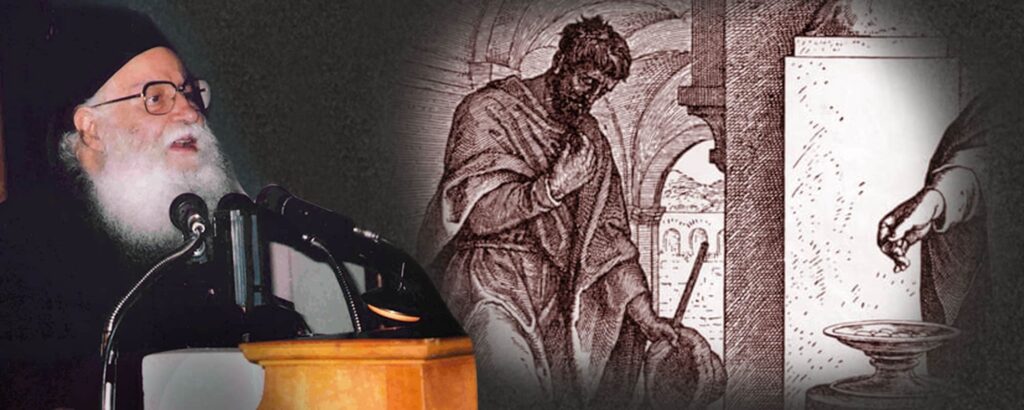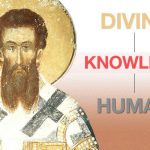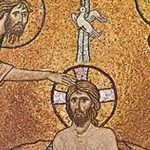
THE SELF-KNOWLEDGE OF THE PUBLICAN
“The Self-knowledge of the Publican”
A homily by Fr. Athanasios Mitilinaios
Sunday of The Publican and the Pharisee (Luke 18:10-14)
Before our eyes, once again, my beloved, is the precious parable of the Publican and the Pharisee. With this parable the Lord wishes to teach many lessons. He speaks to us about humility and pride, about “spiritual ethics”, if you will, sufficiency and insuffiency, about what makes a prayer good or bad, about the appearance of two types of people who go before the Lord, about the self-confidence of the one and the self-knowledge of the other. All this was spoken from the authentic mouth of our Lord Jesus Christ, so every point of the Lord’s teaching is an authentic answer.
The twist of the parable is known. Two men went up into the holy place, that is into the temple, in order to pray. One was a Pharisee, from the known order of the Pharisees, and the other a tax-collector, from among those who collected for the Romans, by way of auctions, in order to get the tribute.
The Pharisee, weighed down with self-confidence from his status, knowledge of the law and good deeds, stands and says his prayer to God with a great amount of self-confidence and arrogance. The tax-collector is also weighed down, however with crimes and various sins, and stands at one end to also say his prayer. His guilt, however, does not permit him to raise his head. The Evangelist Luke points out that He did not even wish to lift his eyes to heaven. He beats his breast constantly, is cut to the heart, grieving in his heart over the multitude of his many sins, and says continuously: “O God, be merciful to me, the sinner.”
We see, my beloved, in the behavior of the tax-collector a conspicuous self-knowledge, for he observed his condition and, as a result, asked mercy from the Lord. He was looking at himself. This is precisely what self-knowledge means: To be able to see yourself.
The Pharisee was not looking at himself, because his arrogance and his self-confidence were in the way, and thus, he was not able to see how he truly was. He thought that only the heavy hitting sins are those which defile a man. This is what the Pharisee believed. He was the type who says (and to this day, there is still the type who say): “I haven’t stolen anything. I haven’t killed anyone. I’m ok.” Whereas the tax-collector, he was looking at his true self.
We ask: What is self-knowledge? Self-knowledge is to be able to see the true condition of yourself. To have knowledge of yourself. Self-knowledge doesn’t deceive you like a delusion or arrogance or self-confidence, because at every moment this self-knowledge shows you the measure of your ability and the depth of your sinfulness. It asks you: Who are you? Self-knowledge, then, is the true knowledge of ourselves. It is the knowledge of the Ancient Greeks: “Know thyself.”
This knowledge of self is dynamic – not static – because at every moment I must know myself. Then, if I know myself, I will not think highly of myself. Instead, I will have in front of me the true, precise knowledge of myself, and this, of course, is humility automatically. I will have made, says St. Basil the Great, a return to my intrinsic worth, a return to my actual worth, that which I truly am.
Self knowledge is always bound with humility. It is not possible to have humility before, automatically. We have humility from a good objective: self-knowledge. Thus, when I have humility, I will also certainly have, inseparably, the help and grace of God, because “God gives His grace to the humble” (Jas 4:6). He gives His grace.
St. Peter Damascene says,
There is nothing better than to know one’s own sickness [weakness] and ignorance, nor anything worse than not recognizing them.1
Moreover, Blessed Nikitas Stithatos emphasizes,
Know yourself; this is indeed humility, the humility that teaches us to be inwardly humble and makes us contrite.2
The work which we have to complete on the earth is the spiritual work. God gave the first-formed couple three commands: the command of fasting (only from one tree, but to test them); the command of cultivating Paradise; and of preserving the hedge of Paradise (Gen. 2:15-17). But Paradise is within us, the kingdom of God is within us (Lk. 17:21). Adam, therefore, had to work and maintain the inner Paradise. Blessed Nikitas says that this is our task, to cultivate and to guard it:
You must cultivate and guard this humility, for if you do not yet know yourself, you cannot know what humility is and you have not yet embarked truly on the task of cultivating and guarding.”3
My beloved, of course we cultivate the earth, we do our biological work, but our primary work is this, the spiritual work. Why is spiritual work also called work? How is it possible to make myself better? Blessed Nikitas continues,
To know oneself is the goal of practicing the virtues.4
And Saint John of the Ladder tells us,
The one who knows himself never sets out to do something beyond himself.5
The one who has knowledge of himself, who knows who he is, also knows his abilities and his limitations. At no time will he be tricked into taking something up which is greater than his abilities. This one, my beloved, has strength in all things, in his spiritual condition, his profession, in anything whatsoever.
You cannot take up something if you do not have self-knowledge, since you may lack this or that. How will you take it up? The Lord tells us two parables about this: The parable of a king preparing to go to war (Lk. 14:31-33) and the parable about building a tower (Lk. 14:28-30).
Someone, it says, begins to build a tower that is very tall (and this is not about our spiritual building), but he does not sit down to figure out the cost, and once it reaches a certain height, the construction is abandoned. Then the passers-by mock, saying, “This man could not complete his construction.”
Is this not someone who is beginning the spiritual life? At some point, he sees that he cannot afford the roof, that is, to cover the spiritual restoration work and he stops the construction altogether. Do you know that we inhabit our buildings which have not been completed? I will put it in simple language: The crows nest there, that is, the passions of the soul return, and they encircle us in the world. Why? Because we do not estimate our abilities.
Did you begin? How will you figure out the cost? Did you start to be Christian? It is straightforward, but be careful. Have you considered whether you will endure the mockeries and persecutions, as we heard in today’s Epistle reading? It says, “Whoever wishes to live a godly life in Christ Jesus will be persecuted” (2 Tim. 3:12). Are you prepared? Are you perhaps someone who does not withstand temptations? Do you compromise with the world? Are you strong? If you have self-knowledge and humility you will know these things.
And how will we maintain true self-knowledge so that we are not tricked into thinking that we know ourselves when we do not? With a constant increase in humility; by becoming as humble as we can be so that our eyes open better; by taking a sincere look at ourselves, straight in the eyes.
If two men, who have no association with each other at all and who do not know each other, both tell me that I have the same shortcoming, then I register the thought, because if only one tells me, it is possible for me to dismiss it, but if both tell me, then I surely begin to ponder and say, “This is how it is”, even though I do not see it. I will begin to see it, and then I will discover it.
Moreover, at every moment, look within and examine yourself. Why? Because as I said, self-knowledge is dynamic. Must I examine how things are going with myself at every moment? The one who does so does well. Isn’t it good to ask forgiveness from God?
Saint Basil the Great suggests a certain technique, a method, that helps greatly in preventing repeated mistakes: When the day is over, make an examination of our past misdeeds, a cross-examination our consciences. How did we sin? How did I do today? How did things go? Did they go well? Did they not go well? 6
In our evening prayers, the Psalmist says, as he lays in bed (and we also in our own prayer): O Lord, today I struck You; I did this, this and this. Please forgive. And if it is something considerable, we make a note of it during our prayer to confess it. Are we doing well? We say “Glory be to God.” Are we not doing well? “Forgive us, O Lord.” Do this every evening. Then we can recognize ourselves at every hour and understand where we are.
The fruit of self-knowledge, my beloved, is the entire posture and movement of the tax-collector in his prayer. Did you see him? Did you observe? Did you also see the other? “Standing”, it says. He wore himself out offering prayers and said, “God, thank you.”7 Certainly, it is very important to say thank you to God and we must give thanks at every moment: “Glory be to God”, “Thank You, O Lord”; and every evening, “Thank you, O Lord”, but to say the thank you with arrogance, “that I am not like the others, the sinners”, this is something very terrible. He sees the tax-collector in the back. What was he doing there? Not only was he showing humility of soul, but also humility of body. How? With tears, with bows, with groans, with the downward inclination of his head. “He did not dare”, it says, “lift his eyes to heaven.” He looked to the ground.
Most significantly, the tax-collector in the parable grieved in his heart, and also had a prayer in his mouth and in his heart: “God, be merciful to me, the sinner.” That is, O Lord, be merciful, sympathetic, compassionate. Forgive me, the sinner. It means: If you exercise Your justice, O Lord, who can stand before You? The Psalmist says: Who is able to stand before God if God exercises His justice? No one. (Ps. 142:2)
Moreover, the fruit of self knowledge is that which we encounter frequently in the sayings of the Desert Fathers: “All will be saved but me.”
Moreover, it is that which St. Paul said: “I am the greatest of sinners” (1 Tim 1:16). As more time passed he descended the stairs. He says in his epistles, “I am the least of the Apostles” (1 Cor 15:9). Then later, as he had matured more, he writes, “I am the least of men” (Eph. 3:8). Finally, toward the end of his life he writes, “I am the greatest of sinners” (1 Tim. 1:15).
It is that which Saint Silouan the Athonite said: “Keep your mind in hell and despair not.” 8
Beloved, our Lord painted a colorful picture in the parable of the tax-collector and the Pharisee, in order to teach us self-knowledge and humility. We conclude with the same line of the parable: “All those who exalt themselves will be humbled, and all who humble themselves will be exalted.”
ΤΕΛΟΣ
ΚΑΙ ΤΩ ΘΕΩ ΔΟΞΑ
Translated by Anthony Hatzidakis, February 27, 2024, to the best of his ability, from source audio Homily #629 on www.arnion.gr. Some sentences have been amended.
- Philokalia, Vol. 3, St. Peter Damascene, Book 1, Treasury of Divine Knowledge, “That We Should Not Despair Even If We Sin Many Times”.
- Philokalia, Vol. 4. On the Inner Nature of Things and on the Purification of the Intellect: One Hundred Texts, #35
- ibid.
- ibid.
- see The Ladder of Divine Ascent, Classics of Western Christianity Series
- Quote amended. See also Saint Basil and his rule, E.F. Morison, B.D., Oxford, London, 1912. pp. 64-65.
- This note is the author’s, which we made a footnote: “(God is used as the vocative case, O God; very many times we find the nominative case used as the vocative)”
- See St. Silouan the Athonite, [St.] Elder Sophrony, tr. Rosemary Edmonds.




Dear Lord, help me to always consider spiritual work more important than any other, so I can maintain the inner paradise.
Ee Bwana, nirehemu mimi mwenye dhambi na uniokoe. Amina